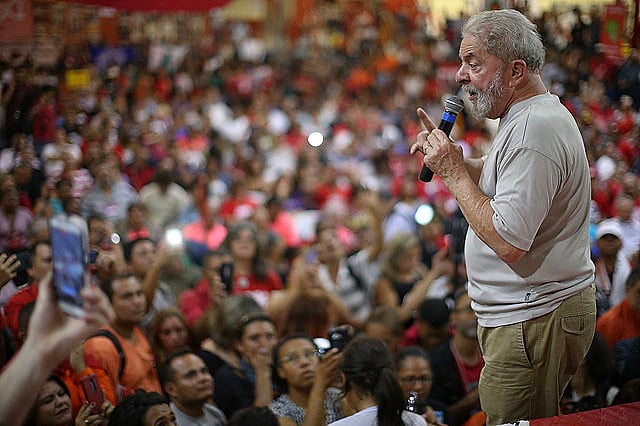A Supreme Court panel will rule on a new appeal filed by the defense team of Brazil’s former president Luiz Inácio Lula da Silva to suspend his sentence, upheld in January by a regional appeals court, while the case is still pending his final decision.
The defense’s argument, which had been previously presented to the appeals court that upheld the sentence (TRF-4), is that there were irregular proceedings in the ex-president’s trial. One of their arguments is that judge Sérgio Moro, who tried the case, was biased. The lawyers also argue that Lula is a former president who left office in 2010 with high popularity ratings and does not pose a risk to the country.
The Supreme Court panel that will review the appeal includes Justice Edson Fachin, who is the judge-rapporteur of Operation Car Wash cases, as well as justices Celso de Mello, Dias Toffoli, Gilmar Mendes, and Ricardo Lewandowski. While Toffoli, Mendes, and Lewandowski have expressed opinions against arresting convicted felons while their cases are still pending appeal, Pedro Serrano, a jurist and professor at the Pontifical University of São Paulo, argues that the court system is facing a widespread contamination by political interests.
“We’re not living in times when democracy is working properly. That's the issue. We don’t have an independent court system today that could acquit Lula, take him out of jail, and allow him to run for president,” Serrano says. Nevertheless, the professor says recent rulings by the same Supreme Court panel that will review Lula’s appeal on Tuesday show that there are judges who remain truthful to their commitment with defending the country’s Constitution.
Gleisi Hoffmann case
Operation Car Wash has taken a blow last Tuesday when that same Supreme Court panel unanimously acquitted senator and Lula’s fellow party member Gleisi Hoffmann, her husband and former minister Paulo Bernardo, and businessman Ernesto Kugler of corruption and money laundering charges filed by the Office of the Federal Attorney General.
While the justices recomended their conviction for slush fund for election campaigns, they acknowledged the charges filed by the Prosecutor’s Office did not have material evidence to back up the accusations made by high-profile informants.
Professor Pedro Serrano says the use of state’s evidence and the irresponsibility of the Prosecutor’s Office by filing charges without the existence of a crime make senator Hoffmann's case similar to ex-president Lula’s trial.
“There is irresponsibility in this country, and this case is a great example of that, in how state’s evidence has been used and the huge opportunity it offers to accuse innocent people, especially high-profile innocent individuals, feeding the appetite for accusation and persecution of part of the Prosecution’s Office, which is becoming increasingly political and, instead of having a professional attitude, are working as if they were right-wing politicians,” Serrano argues.
According to the jurist, cases such as senator Hoffmann’s or ex-president Lula’s, where the lack of evidence compromises the accusation, the Prosecutor’s Office should decide not to file charges.
“The Prosecutor’s Office should not have filed charges in the first place. They have to be responsible in face of the State, Justice, and society. They can’t treat people’s lives like that. The Republic, democracy gives power institutions power, but also requires accountability,” he points out.
Other ruling
Another Supreme Court ruling last week is closely related to the process against ex-president Lula. The court ruled last Thursday that compelling the attendance of the accused is unconstitutional and infringes the right of a suspect to remain in silence.
In March 2016, ex-president Lula was compelled to attend and testify for the Federal Police. The justices, however, decided last week not to exclude testimonies from interrogations that compelled the attendance of witnesses and accused back then, including Lula’s.




